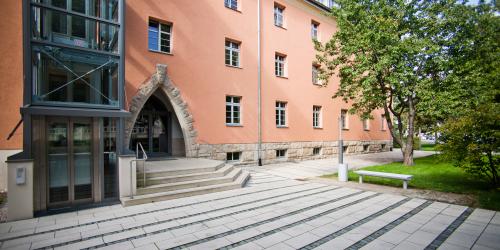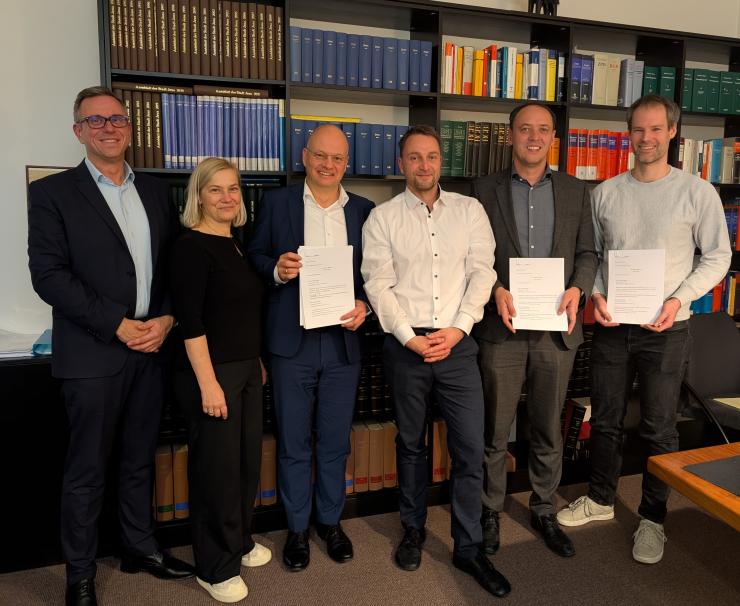
First East German municipality: City of Jena establishes climate protection agency
The city of Jena is the first municipality in eastern Germany to establish a climate protection agency. On Thursday, January 30, 2025, Christian Gerlitz, Mayor and Head of the Department for Urban Development and Environment, Tobias Wolfrum (Managing Director of jenawohnen GmbH), Claudia Budich and André Sack (Board of Directors of the Jena-Thuringia Climate Protection Foundation) and Dr. Simon Münch (Board of Directors of BürgerEnergie Jena eG) signed the corresponding contracts with Hermann Zebisch, Managing Director of the climate protection agency, at the notary's office of Leibe und Dr. Weikart.
"With the founding of the climate protection agency, we have reached an important milestone in realizing Jena's ambitious goal of becoming climate-neutral by 2035. The planned advisory services in the field of energy are particularly important in this regard," emphasizes Mayor Christian Gerlitz.
Advice and information
"We now need to quickly start regular operations and provide the first advisory services for citizens and companies in Jena in a timely manner. The focus of our work will be on practical advice and information. The climate protection agency will establish itself as a central point of contact for questions relating to climate protection and the goal of achieving climate neutrality by 2035," explains Managing Director Hermann Zebisch.
The 44-year-old has extensive experience in the fields of environmental sciences, human resources development, law and natural sciences. Over the past 14 years, he has worked as Managing Director of Eine Welt Netzwerk Thüringen e. V. (One World Network Thuringia), where he campaigned for global justice and education for sustainable development (ESD), among other things.
Hermann Zebisch has lived in Jena for 20 years and has close ties to the city and the region. His expertise and commitment will make a decisive contribution to establishing the Climate Protection Agency as a driving force for climate-neutral urban development.
Tasks of the climate protection agency
As part of the climate action plan, the climate protection agency will implement a total of 14 of the 73 climate protection measures defined in the plan. In addition to energy consulting services, these include a comprehensive campaign to renovate buildings and educational programs on climate and environmental issues at schools.
There is also a special focus on personal advice on topics such as replacing heating systems and using renewable energies. These issues are currently of concern to many citizens and companies, as the municipal heating plan is nearing completion and the framework conditions for phasing out fossil fuels are becoming more concrete.
As a non-profit limited company, the Climate Protection Agency will exclusively serve the purpose of municipal climate protection.
Background
The Climate Protection Agency was founded as a result of the Climate Action Plan adopted by the Jena City Council in April 2023. Its establishment was confirmed by a further city council resolution on January 24, 2024. The articles of association of the climate protection agency were confirmed by a majority of the city council on December 19, 2024.
A support association will be founded in 2025, which all interested parties can join in order to ensure the broadest possible social participation. The association serves to network stakeholders from business, science and civil society and supports the work of the Climate Protection Agency through accompanying projects and high-profile initiatives.
Sponsorship and financing
The Climate Protection Agency is supported by four shareholders:
- City of Jena (47% share)
- jenawohnen GmbH as part of the Stadtwerke Jena Group (47 % share)
- BürgerEnergie Jena eG (3 % share)
- Climate Protection Foundation Jena-Thuringia (3 % share)
These shareholders finance the agency and ensure that the planned climate protection measures are implemented sustainably. In addition to municipal funds, the financing also includes subsidies as well as contributions from business and civil society.

